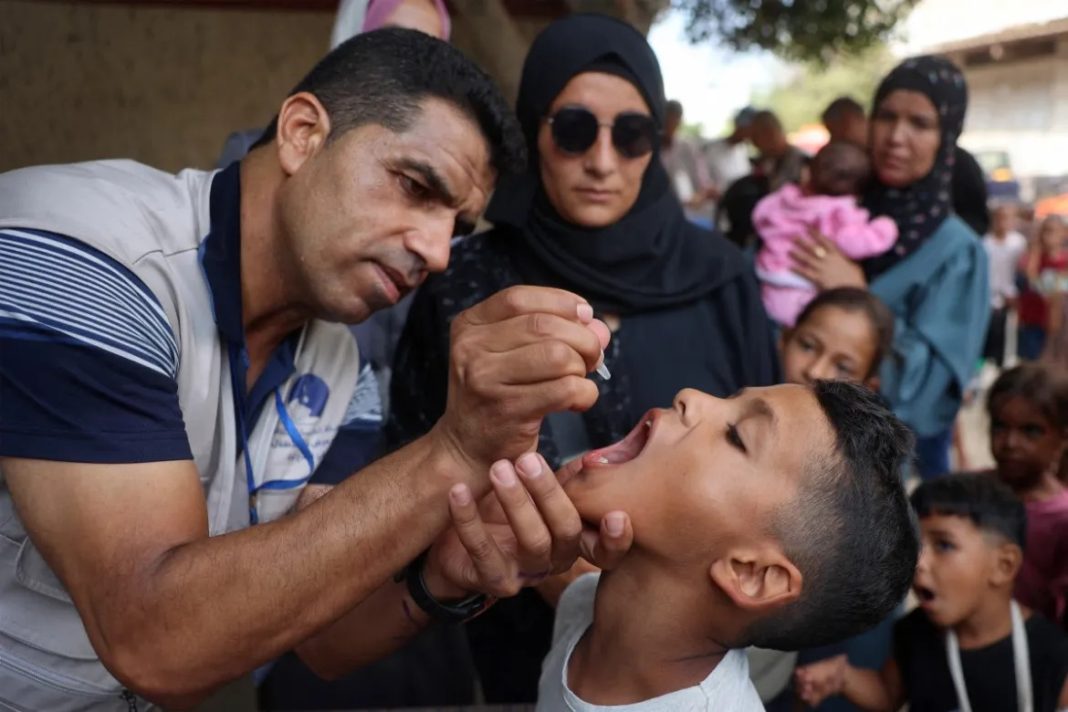The recently concluded three-day campaign was a “rare bright spot” for the coastal enclave, the UN children’s agency’s regional director for the Middle East and North Africa has announced.
“After almost a year of families experiencing horrors no man, woman or child should ever have to endure, this week we saw what can be achieved with simple will,” Adele Khodr said in a statement.
Khodr added the risk of polio spreading in Gaza and beyond “remains high”, adding “area-specific humanitarian pauses” must continue to implement the remaining two phases of the vaccination campaign.
“This is among the most dangerous and difficult vaccination campaigns on the planet.”
“The first phase of the campaign, which ran from 1-3 September, reached more than 189,000 children under 10 years old in the central area of the Gaza Strip, surpassing its initial target. Approximately 513 teams were deployed across the area,” she continued.
The World Health Organization (WHO) also announced the completion on Wednesday of the first phase of its vaccination campaign in central Gaza.
After the first confirmed polio case in the territory in 25 years, a massive vaccination effort began on Sunday. The campaign relies on daily eight-hour pauses in fighting between Israel and Hamas fighters in specific areas of the blockaded enclave.
With Gaza lying in ruins and the majority of its 2.3 million residents forced to flee their homes due to Israel’s military assault – often taking refuge in cramped and unsanitary conditions – disease has spread.
The campaign aims to fully vaccinate more than 640,000 children in the besieged territory, devastated by almost 11 months of war.
Polio primarily affects children under five and can cause deformities, paralysis and in some cases death.
Rik Peeperkorn, the WHO’s representative for the Palestinian territory, stressed it is vital for the vaccination campaign to reach at least 90-percent coverage to avoid the spread of the disease both within Gaza’s borders and beyond.
The campaign began in the central part of the densely populated Gaza Strip, where the WHO initially expected to vaccinate 156,500 children under the age of 10.
“Our target for the central zone was an underestimation,” Peeperkorn said, adding that this was probably due to more people being crowded into the area than anticipated.
He stated the vaccination drive was expected to shift to southern Gaza on Thursday with the aim of immunising 340,000 children there.
It is to then move to the north of the strip, where about 150,000 children are to be vaccinated.
“We still have 10 days to go at least” for the initial portion of the campaign, Peeperkorn stated, and the rollout of the necessary second dose would begin in four weeks.
While polio vaccinations are best carried out in house-to-house campaigns, Peeperkorn said, those are impossible in Gaza because “there’s very few houses left and people are everywhere”.
Peeperkorn also warned that the WHO is “extremely concerned” about Gaza’s wider health situation.
With only 16 of 36 hospitals partially operational, the Gaza Strip has seen a “huge increase in infectious diseases”.
“We’ve seen more than a million, mainly children, diagnosed with acute respiratory infections,” Peeperkorn said, adding that more than 600,000 children had suffered from diarrhoea.
Israel launched its military onslaught on Gaza after Hamas led an attack on southern Israel on October 7, killing at least 1,200 people.
Promising to destroy Hamas, Israel launched an assault on Gaza, which has killed at least 40,800 people, mostly women and children, according to Palestinian officials.
